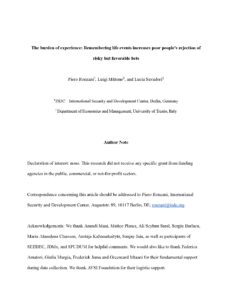The burden of poverty is caused by both material deprivation and the psychological threat associated with it. Poverty has been found to diminish cognitive ability and cause the poor to forego beneficial programs. In the present study, we examined how exacerbating the psychological burden of poverty through an intervention that asked participants to recall a negative personal experience that made them feel unsuccessful influences the rate of acceptance of mixed gambles. Mixed gambles yield both gains and losses and simulate choices in life that contain both a risk of loss and an opportunity for gain. A second group of participants was asked to recall a positive personal experience that made them feel successful or proud, while a third group was not assigned any recall task. Experiment 1 targeted the intervention to a group of people living in extreme poverty in Kenya. Experiment 2 replicated the study in a group of non-poor students in Italy. Experiment 3 replicated the study online with a heterogeneous sample of people living in the United Kingdom. Results showed that recalling a negative life experience significantly reduced the average expected value of the accepted gambles. Recalling a positive life experience also significantly reduced the average expected value of accepted bets, although to a lesser extent. However, the treatments only affected poor individuals (Experiment 1),whereas non-poor individuals (Experiments 2 and 3) were immune to this effect. In addition, neither education nor cognitive ability was found to mediate the effect. These findings show that the burden of poverty can increase loss aversion, discouraging the poor from accepting risky investments with a positive expected value that could help them escape poverty in the long run, such as investments in personal education, small businesses, or retirement plans.
Publication Details
- Year of Publication: 2024
- Region/s: Europe · Sub-Saharan Africa
- Theme/s: Individual Decision-making
- Research Topic/s: Poverty & Inequality
- DOI: https://doi.org/10.31234/osf.io/tmwq2




